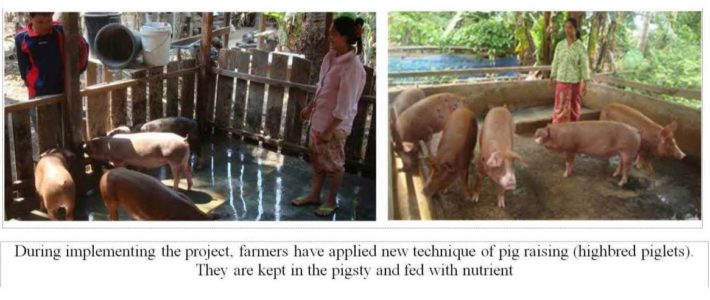Success Story: Farmer Cooperative, a good way to reduce poverty
Preah Rumkel Commune, located in Thalaborivat district, Stung Treng province, is a remote and poor commune consisting of 8 villages with a population of 5,346 people (2,681 female) living in 972 households. People mostly depend on agricultural activities (95%) and 43% of the target households lived below the poverty line (USD 1 per day) before joining the farmer co-op. The biggest challenges were a lack of capacity to develop and implement micro-enterprises, low market prices, and shortage of capital preventing them from scaling up their businesses.
In late 2010, WE Fund was introduced to poor farmers in Preah Rumkel through MB’s project. The aim was to enable them to develop capacities and adapt mechanisms for sustainable community livelihood improvement, particularly for micro-business development. They established a Farmer Cooperative named Preah Rumkel Farmer Cooperative (PRK-FC) with 43 members (31 females) in 2012, which was officially registered on February 19, 2014. The members of the FC committee were trained in management, Self Help Group (SHG) development, and marketing. FC members received training in pig and chicken raising, home gardening, and compost making. In order to increase the FC’s capital, the project formed a self-help group (SHG) to mobilize resources from FC members and others. In 2015 they had accumulated a total capital of US$ 38,687 for providing credit services to FC members for the development of businesses and supported model farmers to apply new technologies (5 model farmers for pig raising and another 5 for chicken raising). With trainings and a credit scheme 26 FC members have replicated the new technologies, which were introduced by the project. They raised 405 pigs in 2014 and 524 in 2015.
Since their establishment, the FC has also started a slaughterhouse business, which enables FC members to sell their pork products at the local market, achieving higher profits for their products compared to selling live pigs. Additionally, they have just initiated a new business of pig feed production, which will enable farmers to buy high quality feed at a good price and to gain additional profits from its sales.
They generated US$ 31,487 of income and gained US$ 5,617 of profits in 2015. In 2014, each of them earned USD 653 on average per year, which is a higher profit compared to using traditional farming techniques. Up to 2015, 75 FC members (51 female) benefited from FC’s services and profits. All members are happy with their achievements and are looking forward to a bright future: “Our lives have changed since we started this business. We will therefore continue pig raising and other services in order to have a stable income and a better life.” Based on our survey, we found that 32% of total annual income of farmers was generated from applying training knowledge through micro-business operation in 2015.

